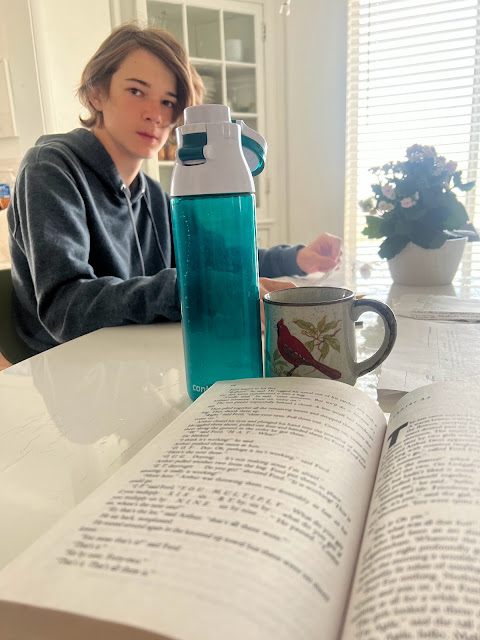Be Generous (When Writing About People You Don't Like)
"You own everything that happened to you. Tell your stories. If people wanted you to write warmly about them, they should have behaved better." --Anne Lamott
A couple months ago I attended a lecture by the great Mormon scholar and historian Claudia Bushman about the importance of women writing their histories. If we want to have a future, we have to have a history.
After presenting her data, collections and experience of compiling an anthology of Mormon women's stories, we were allowed to ask questions. Someone in the audience asked about the ever-present conundrum of writing about people who were unkind to us--those who abused us, mistreated us, presented a bad character for the stories of our lives--what about those people? And in my world, I think about this in a public sphere--how do we write publicly about these people? Some of us still carry fear around them, and some of them are still our uncles, and some of them read our blogs.
Claudia's response was this, "Be generous."
I thought about that response. And I thought about it some more and I am still thinking about it.
Be generous. I suppose she meant, don't be overly demonizing of the antagonists of your stories. They are, after all, people. But I have also thought about flipping this idea, and saying, be generous about the truth. It seems to me, when we can look at a person's life honestly and without any blurry technique of carefully-worded manipulation, we can feel empathy for just about anyone. If you choose to write about people in your life publicly, choose to write about them truthfully. And be generous with that truth.
Truth, isn't perspective. When writing about someone, take yourself out of the character assessment and try to see them as neutral. Your perspective is tainted and you will have to own up to that. But truth considers all the factors, it consumes an entire being, it doesn't omit the good or the bad or the ugly--honesty embraces them all with balance and enlightenment. If you choose write truthfully, everyone wins. Truth makes everything illuminated and right.
And be generously truthful with yourself too.
Truth also doesn't float to the top easily. It's usually anchored, weighed down at the bottom of an ocean of human nature. So don't trust your first instinct. Dig and dig and dig before you are sure you've found the bottom. When I wrote about Page yesterday, about how she felt her worth was in her fertility, it was the result of many, many conversations about who we are as people and as sisters. When we write we are anthropologists of the soul--digging and digging until we've pieced together our personal mysteries.
Anyway, that's it: be generous. Every once and awhile stop your fingers from clacking on that keyboard and ask yourself, Am I being generous? To myself? To others? To the situation? To the scenery? To the sentiment? To the truth?
Want to discuss this more? We're on facebook today chatting about it. Join us!
A couple months ago I attended a lecture by the great Mormon scholar and historian Claudia Bushman about the importance of women writing their histories. If we want to have a future, we have to have a history.
After presenting her data, collections and experience of compiling an anthology of Mormon women's stories, we were allowed to ask questions. Someone in the audience asked about the ever-present conundrum of writing about people who were unkind to us--those who abused us, mistreated us, presented a bad character for the stories of our lives--what about those people? And in my world, I think about this in a public sphere--how do we write publicly about these people? Some of us still carry fear around them, and some of them are still our uncles, and some of them read our blogs.
Claudia's response was this, "Be generous."
I thought about that response. And I thought about it some more and I am still thinking about it.
Be generous. I suppose she meant, don't be overly demonizing of the antagonists of your stories. They are, after all, people. But I have also thought about flipping this idea, and saying, be generous about the truth. It seems to me, when we can look at a person's life honestly and without any blurry technique of carefully-worded manipulation, we can feel empathy for just about anyone. If you choose to write about people in your life publicly, choose to write about them truthfully. And be generous with that truth.
Truth, isn't perspective. When writing about someone, take yourself out of the character assessment and try to see them as neutral. Your perspective is tainted and you will have to own up to that. But truth considers all the factors, it consumes an entire being, it doesn't omit the good or the bad or the ugly--honesty embraces them all with balance and enlightenment. If you choose write truthfully, everyone wins. Truth makes everything illuminated and right.
And be generously truthful with yourself too.
Truth also doesn't float to the top easily. It's usually anchored, weighed down at the bottom of an ocean of human nature. So don't trust your first instinct. Dig and dig and dig before you are sure you've found the bottom. When I wrote about Page yesterday, about how she felt her worth was in her fertility, it was the result of many, many conversations about who we are as people and as sisters. When we write we are anthropologists of the soul--digging and digging until we've pieced together our personal mysteries.
Anyway, that's it: be generous. Every once and awhile stop your fingers from clacking on that keyboard and ask yourself, Am I being generous? To myself? To others? To the situation? To the scenery? To the sentiment? To the truth?
Want to discuss this more? We're on facebook today chatting about it. Join us!

